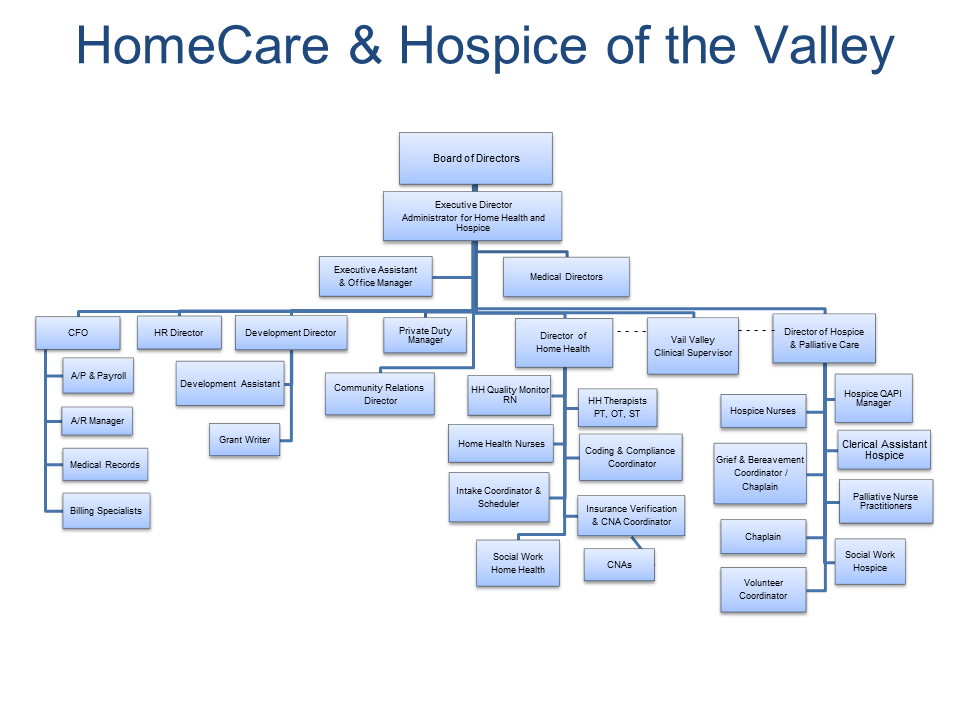Hospice of the Valley Patient-Care Team Profile
- Medical Director
- Hospice Director
- Nurse Practitioner
- Registered Nurses
- Volunteers
- Volunteer Coordinator
- Certified Nurses Assistant (CNA)
- Social Workers
- Spiritual and Bereavement Guides
- Occupational Therapy
- Physical Therapy
- Massage Therapy
- Speech Therapy
First and foremost our team includes the patient and family. They are always at the center of decisions. This makes the profile of the team for each patient different. Beyond that, we have a dedicated group of individuals consisting of the following:
Medical Director
Our medical directors act as consultants to our team members and the referring Doctors. His/her role is to listen to the reports from our nurses, our patients, our patients’ families and our volunteers. The medical director helps identify the best pain management course, signs all prescriptions and supports the nursing staff through dialogue pertaining to each individual case.
Hospice Director
The hospice director is the liaison between patients, their families, and the medical staff. He/she coordinates quality end-of-life care for our 6,000 square-mile service area. This individual is an RN with extensive hospice experience who directs, supervises, and governs the hospice program including inpatient care, home care and bereavement follow-up. The hospice director also administers and maintains quality assurance, environmental, and infection control policies, and develops hospice related educational and informational programs. The hospice director also supervises the medical social workers, chaplains and volunteer coordinator.
Registered Nurses
Hospice nurses are highly proficient at individualized pain management and assessment. It is their job to help establish a plan of care based on what the patient’s goals are. This includes putting into place a plan for pain medication and symptom control. In addition, the nurses are responsible for educating the family on this plan and on other aspects of care such as the use of medical equipment, skin care, nutrition and transfers. The role of the Hospice nurse encompasses emotional care and the ability to communicate in a clear and compassionate way.
Nurse Practitioner
Some Hospices serve upwards of 1 ,000 or more patients a year and have enormous staff rosters. Hospice of the Valley is a small not-for-profit Hospice serving a large geographical area. We have part-time and full-time staff. Our nurse practitioner oversees and helps support the RN’s and CNA’s.
Volunteers
Hospice volunteers play an important role as part of the Inter Disciplinary Group. They provide a variety of services to help meet the needs of the patients and families. They advocate for the family, offering companionship, light housekeeping assistance or providing critical respite for the primary caregiver. Volunteers provide valuable feedback to the rest of the team concerning how they see the patient doing, while giving an additional perspective on the ongoing family dynamics in the house. There are numerous other ways volunteers can help through nonpatient-related activities such as helping with newsletter mailings, writing acknowledgment cards when contributions are made, helping with fundraisers and helping to keep admission packets complete and available for the nursing staff.
Volunteer Coordinator
It is the coordinator’ s job to maintain communication with the family and the nursing staff to help assess when volunteer services are appropriate and would be helpful. The coordinator helps the family identify what their needs are and finds the volunteers who can best meet those needs. The coordinator will offer emotional support and guidance to volunteers as well as offering training and supervision. The volunteer coordinator works closely with the rest of the team to assist in any way possible.
Certified Nurse Assistant (CNA)
The CNA provides personal care to patients such as bathing and hair-washing. He/she also assists the family in learning other physical aspects of caring for the patient, such as how to move and dress with a minimum of discomfort. The CNA is an invaluable member of the team and develops a very close relationship with the families.
Social Worker
Hospice Social Workers are skilled in psychosocial assessment, family dynamics, group work, financial issues, advanced directives, funeral arrangements, child services and bereavement. An amazing amount of responsibility falls within the scope of what the social worker’s role is in a Hospice situation. Overall, the social workers job is to do whatever can be done to help the patient and families learn to cope with the daily trials of living with terminal illness.
Pharmacist
Pharmacists play a critical role in care planning. Hospice of the Valley contracts with local pharmacists who know the latest and best medications on the market for targeting different kinds of pain while allowing a patient to maintain dignity and lucidity. Through close and thorough dialogue with our clinical staff they help us offer the best combination of drugs for each individual patient.
Spiritual Care
The role of a hospice chaplain is varied. Religious beliefs are not imposed on the patients. Chaplains listen and endeavor to help patients cope with the questions raised by their illness, encouraging them to talk about their concerns and discover their own meaningful answer. Sometimes patients need to vent their feelings. Feelings of anxiety, anger, frustration and sadness are normal.
On other occasions, the chaplain’s role is to help the family and other caregivers become more sensitive and responsive to patient needs, enabling the caregivers to be more caring, supportive and understanding.
If it is the patient’s wish, the chaplain will read to them and/or offer prayers, appropriate to the patient’s faith or tradition. Rituals may also be performed, if they appear to be a source of comfort to the patient. The chaplain may also assist with funeral planning and officiate at funeral services. The primary purpose is to provide patients with the presence of someone who is fully present and authentically caring, helping patients during this stage of their life to maintain dignity, grace and choice.
Bereavement Coordinator
Our bereavement coordinator is the point person for helping patients and families cope with loss, grief and death. He or she is extensively trained and often also does the work of chaplain. Our grief and bereavement services are available to a family for 13 months after the patient dies.


